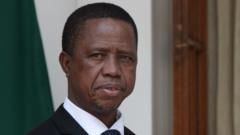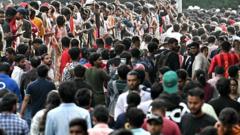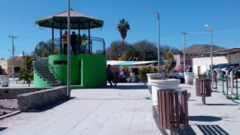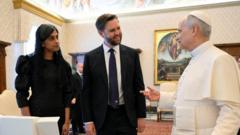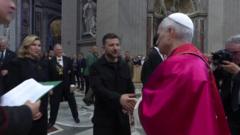Worldwide tributes pour in for the late Pope Francis as the Catholic Church prepares for a significant yet simplified funeral service this Saturday.
Pope Francis' Funeral on Saturday to Reflect a Simpler Legacy

Pope Francis' Funeral on Saturday to Reflect a Simpler Legacy
As the world mourns the passing of the influential pontiff, preparations for a unique and modest farewell unfold in Vatican City.
In death, Pope Francis continues to reflect his values of simplicity and humility as arrangements are set for his funeral at St. Peter's Basilica on Saturday at 10 a.m. The pontiff, who passed away at the age of 88 due to a cerebral stroke, instructed that his burial be modest—favoring a single undecorated coffin instead of the traditional nested types. This decision was consistent with his life choices, as he often preferred a simple apartment over the grandeur of the Apostolic Palace.
Cardinals from across the globe are converging in Vatican City for this complex event, which traditionally culminates in a conclave to elect his successor. They convened for their first meeting on Tuesday morning, discussing the necessary procedures for the pope's interment and the subsequent papal election process. Observers predict that the selection process will not only determine the church's future leadership but also potentially reshape its direction amid changing global values.
The funeral service will incorporate simplified rules established by Francis, incorporating elements meant to foster a celebration of his life and legacy. High-profile attendees, including political and religious leaders, are expected to gather. However, the landscape of his funeral will starkly contrast with the political spheres of his papacy, as many world leaders now in power differ significantly from those who straightforwardly supported his progressive stances on various issues.
In Argentina, the pope's homeland, memorial Masses have begun, and there are plans for seven days of mourning, reflecting the deep emotional connection many had to Francis, who served as a figure of inclusion and compassion. His focus on themes such as climate change, migration, and social justice left an indelible mark on millions worldwide.
The Vatican has confirmed that Francis's body will be laid in state at St. Peter's Basilica, allowing mourners to pay their respects. As nations around the world lower flags to half-mast, including countries heavily influenced by the Catholic faith, an official period of mourning has been established in several nations, showcasing the global impact of his teachings.
As the preparations for his funeral continue, many reflect on the pontiff's paradox of being a voice of hope and change, while also facing opposition from conservative factions within the church, which may shape the dialogue surrounding his successor.
Among the predictions of potential candidates for pope, discussions have emerged about future leaders who may align with both Francis's progressive agenda and return to traditional conservatism. The political landscape within the Vatican remains fluid, with many anticipating how the next pope will address contemporary issues facing the church and the world.
As tributes pour in, the influence of Pope Francis will remain present in conversations about the future trajectory of not just the Catholic Church but society at large, reflecting the values he championed during his papacy.
Cardinals from across the globe are converging in Vatican City for this complex event, which traditionally culminates in a conclave to elect his successor. They convened for their first meeting on Tuesday morning, discussing the necessary procedures for the pope's interment and the subsequent papal election process. Observers predict that the selection process will not only determine the church's future leadership but also potentially reshape its direction amid changing global values.
The funeral service will incorporate simplified rules established by Francis, incorporating elements meant to foster a celebration of his life and legacy. High-profile attendees, including political and religious leaders, are expected to gather. However, the landscape of his funeral will starkly contrast with the political spheres of his papacy, as many world leaders now in power differ significantly from those who straightforwardly supported his progressive stances on various issues.
In Argentina, the pope's homeland, memorial Masses have begun, and there are plans for seven days of mourning, reflecting the deep emotional connection many had to Francis, who served as a figure of inclusion and compassion. His focus on themes such as climate change, migration, and social justice left an indelible mark on millions worldwide.
The Vatican has confirmed that Francis's body will be laid in state at St. Peter's Basilica, allowing mourners to pay their respects. As nations around the world lower flags to half-mast, including countries heavily influenced by the Catholic faith, an official period of mourning has been established in several nations, showcasing the global impact of his teachings.
As the preparations for his funeral continue, many reflect on the pontiff's paradox of being a voice of hope and change, while also facing opposition from conservative factions within the church, which may shape the dialogue surrounding his successor.
Among the predictions of potential candidates for pope, discussions have emerged about future leaders who may align with both Francis's progressive agenda and return to traditional conservatism. The political landscape within the Vatican remains fluid, with many anticipating how the next pope will address contemporary issues facing the church and the world.
As tributes pour in, the influence of Pope Francis will remain present in conversations about the future trajectory of not just the Catholic Church but society at large, reflecting the values he championed during his papacy.




